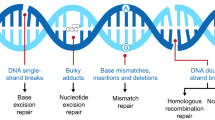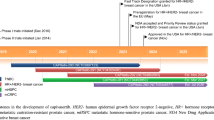Abstract
Background
We investigated the efficacy and safety of metronomic chemotherapy with combined irinotecan and tegafur–gimeracil–oteracil potassium (TS-1) in patients with metastatic and recurrent breast cancer (MRBC), and the association between irinotecan metabolizing enzyme UDP-glucuronosyltransferase 1A1 (UGT1A1) gene polymorphisms and adverse events.
Methods
The study group comprised 40 patients aged 35–79 years. Irinotecan (60 mg/m2 in 5 % dextrose) was administered by 120-min infusion on days 1, 8, and 15 every 4 weeks. TS-1 (prescribed in a standard quantity) was administered at 80 mg/m2/day orally on days 3–7, 10–14, and 17–21 every 4 weeks.
Results
Tumor response data were available for 34 patients. Median follow-up was 12 months (range 1–45 months). Response rate was 47 % (one complete and 15 partial responses). Stable disease was observed in 17 patients (50 %). One patient had disease progression (3 %). Median progression-free survival was 14 months [95 % confidence interval (CI), 10–26]. Median overall survival was 26 months (95 % CI not calculable owing to sample size), and 79.3 % of patients survived for 1 year. The most common grade 3 or 4 adverse events were neutropenia (15 %), leukopenia (12.5 %), diarrhea (7.5 %), and anemia (2.5 %). All other adverse events were grade 1 or 2. Treatment-related toxicity was generally modest and manageable. No significant correlation was observed between UGT1A1 polymorphisms and hematological or non-hematological toxicities.
Conclusions
Metronomic chemotherapy with combined irinotecan and TS-1 was effective in MRBC patients. Adverse effects were mild and the regimen was safely administered without identifying UGT1A1 polymorphisms.



Similar content being viewed by others
References
Fossati R, Confalonieri C, Torri V, Ghislandi E, Penna A, Pistotti V, et al. Cytotoxic and hormonal treatment for metastatic breast cancer: a systematic review of published randomized trials involving 31,510 women. J Clin Oncol. 1998;16:3439–60.
Paterson AH, Szafran O, Cornish F, Lees AW, Hanson J. Effect of chemotherapy on survival in metastatic breast cancer. Breast Cancer Res Treat. 1981;1:357–63.
A’Hern RP, Smith IE, Ebbs SR. Chemotherapy and survival in advanced breast cancer: the inclusion of doxorubicin in Cooper type regimens. Br J Cancer. 1993;67:801–5.
Bishop JF, Dewar J, Toner GC, Smith J, Tattersall MH, Olver IN, et al. Initial paclitaxel improves outcome compared with CMFP combination chemotherapy as front-line therapy in untreated metastatic breast cancer. J Clin Oncol. 1999;17:2355–64.
Chan S, Friedrichs K, Noel D, Pintér T, Van Belle S, Vorobiof D, et al. Prospective randomized trial of docetaxel versus doxorubicin in patients with metastatic breast cancer. J Clin Oncol. 1999;17:2341–54.
Sledge GW, Neuberg D, Bernardo P, Ingle JN, Martino S, Rowinsky EK, et al. Phase III trial of doxorubicin, paclitaxel, and the combination of doxorubicin and paclitaxel as front-line chemotherapy for metastatic breast cancer: an intergroup trial (E1193). J Clin Oncol. 2003;21:588–92.
Von Hoff DD, Layard MW, Basa P, Davis HL Jr, Von Hoff AL, Rozencweig M, et al. Risk factors for doxorubicin-induced congestive heart failure. Ann Intern Med. 1979;91:710–7.
Perez EA, Vogel CL, Irwin DH, Kirshner JJ, Patel R. Multicenter phase II trial of weekly paclitaxel in women with metastatic breast cancer. J Clin Oncol. 2001;19:4216–23.
Kawato Y, Aonuma M, Hirota Y, Kuga H, Sato K. Intracellular roles of SN-38, a metabolite of the camptothecin derivative CPT-11, in the antitumor effect of CPT-11. Cancer Res. 1991;51:4187–91.
Perez EA, Hillman DW, Mailliard JA, Ingle JN, Ryan JM, Fitch TR, et al. Randomized phase II study of two irinotecan schedules for patients with metastatic breast cancer refractory to an anthracycline, a taxane, or both. J Clin Oncol. 2004;22:2849–55.
Taguchi T, Yoshida Y, Izuo M, Ishida T, Ogawa M, Nakao I, et al. An early phase II study of CPT-11 (irinotecan hydrochloride) in patients with advanced breast cancer [Article in Japanese]. Gan To Kagaku Ryoho. 1994;21:83–90.
Taguchi T, Tominaga T, Ogawa M, Ishida T, Morimoto K, Ogawa N. A late phase II study of CPT-11 (irinotecan) in advanced breast cancer. CPT-11 Study Group on Breast Cancer [Article in Japanese]. Gan To Kagaku Ryoho. 1994;21:1017–24.
Fukushima M, Satake H, Uchida J, Shimamoto Y, Kato T, Takechi T, et al. Preclinical antitumor efficacy of S-1: a new oral formulation of 5-fluorouracil on human tumor xenografts. Int J Oncol. 1998;13:693–8.
Shirasaka T, Nakano K, Takechi T, Satake H, Uchida J, Fujioka A, et al. Antitumor activity of 1 M tegafur-0.4 M 5-chloro-2,4-dihydroxypyridine-1M potassium oxonate (S-1) against human colon carcinoma orthotopically implanted into nude rats. Cancer Res. 1996;56:2602–6.
Sugimachi K, Maehara Y, Horikoshi N, Shimada Y, Sakata Y, Mitachi Y, et al. An early phase II study of oral S-1, a newly developed 5-fluorouracil derivative for advanced and recurrent gastrointestinal cancers. The S-1 Gastrointestinal Cancer Study Group. Oncology. 1999;57:202–10.
Saeki T, Takashima S, Sano M, Horikoshi N, Miura S, Shimizu S, et al. A phase II study of S-1 in patients with metastatic breast cancer — a Japanese trial by the S-1 Cooperative Study Group, Breast Cancer Working Group. Breast Cancer. 2004;11:194–202.
Hara F, Kiyoto S, Takahashi M, Takabatake D, Takashima S, Aogi K, et al. Efficacy and safety of S-1 in patients with metastatic breast cancer: retrospective review in a single institution. Oncology. 2010;79:273–7.
Tsunoda A, Yasuda N, Nakao K, Narita K, Watanabe M, Matsui N, et al. Phase II study of S-1 combined with irinotecan (CPT-11) in patients with advanced colorectal cancer. Oncology. 2009;77:192–6.
Goto A, Yamada Y, Yasui H, Kato K, Hamaguchi T, Muro K, et al. Phase II study of combination therapy with S-1 and irinotecan in patients with advanced colorectal cancer. Ann Oncol. 2006;17:968–73.
Inokuchi M, Yamashita T, Yamada H, Kojima K, Ichikawa W, Nihei Z, et al. Phase I/II study of S-1 combined with irinotecan for metastatic advanced gastric cancer. Br J Cancer. 2006;94:1130–5.
Ando Y, Saka H, Ando M, Sawa T, Muro K, Ueoka H, et al. Polymorphisms of UDP-glucuronosyltransferase gene and irinotecan toxicity: a pharmacogenetic analysis. Cancer Res. 2000;60:6921–6.
Oken MM, Creech RH, Tormey DC, Horton J, Davis TE, McFadden ET, et al. Toxicity and response criteria of the Eastern Cooperative Oncology Group. Am J Clin Oncol. 1982;5:649–55.
Ogata Y, Sasatomi T, Akagi Y, Ishibashi N, Mori S, Shirouzu K. Dosage escalation study of S-1 and irinotecan in metronomic chemotherapy against advanced colorectal cancer. Kurume Med J. 2009;56:1–7.
Therasse P, Arbuck SG, Eisenhauer EA, Wanders J, Kaplan RS, Rubinstein L, et al. New guidelines to evaluate the response to treatment in solid tumors. European Organization for Research and Treatment of Cancer, National Cancer Institute of the United States, National Cancer Institute of Canada. J Natl Cancer Inst. 2000;92:205–16.
Sai K, Saeki M, Saito Y, Ozawa S, Katori N, Jinno H, et al. UGT1A1 haplotypes associated with reduced glucuronidation and increased serum bilirubin in irinotecan-administered Japanese patients with cancer. Clin Pharmacol Ther. 2004;75:501–15.
Hasegawa Y, Sarashina T, Ando M, Kitagawa C, Mori A, Yoneyama M, et al. Rapid detection of UGT1A1 gene polymorphisms by newly developed Invader assay. Clin Chem. 2004;50:1479–80.
Kaplan EL, Meier P. Nonparametric estimation from incomplete observations. J Am Stat Assoc. 1958;53:457–81.
Uedo N, Narahara H, Ishihara R, Takiuchi H, Goto M, Fujitani K, et al. Phase II study of a combination of irinotecan and S-1 in patients with advanced gastric cancer (OGSG0002). Oncology. 2007;73:65–71.
Kerbel RS, Kamen BA. The anti-angiogenic basis of metronomic chemotherapy. Nat Rev Cancer. 2004;4:423–36.
Fedele P, Marino A, Orlando L, Schiavone P, Nacci A, Sponziello F, et al. Efficacy and safety of low-dose metronomic chemotherapy with capecitabine in heavily pretreated patients with metastatic breast cancer. Eur J Cancer. 2012;48:24–9.
Wang Z, Lu J, Leaw S, Hong X, Wang J, Shao Z, et al. An all-oral combination of metronomic cyclophosphamide plus capecitabine in patients with anthracycline- and taxane-pretreated metastatic breast cancer: a phase II study. Cancer Chemother Pharmacol. 2012;69:515–22.
Dellapasqua S, Bertolini F, Bagnardi V, Campagnoli E, Scarano E, Torrisi R, et al. Metronomic cyclophosphamide and capecitabine combined with bevacizumab in advanced breast cancer. J Clin Oncol. 2008;26:4899–905.
Torigoe S, Ogata Y, Matono K, Shirouzu K. Molecular mechanisms of sequence-dependent antitumor effects of SN-38 and 5-fluorouracil combination therapy against colon cancer cells. Anticancer Res. 2009;29:2083–9.
Sai K, Sawada J, Minami H. Irinotecan pharmacogenetics in Japanese cancer patients: role of UGT1A1*6 and *28 [Article in Japanese]. Yakugaku Zasshi. 2008;128:575–84.
Innocenti F, Undevia SD, Iyer L, Chen PX, Das S, Kocherginsky M, et al. Genetic variants in the UDP-glucuronosyltransferase 1A1 gene predict the risk of severe neutropenia of irinotecan. J Clin Oncol. 2004;22:1382–8.
http://www.fda.gov/ohrms/dockets/ac/05/briefing/2005-4180b_05_05_Irinotecan%20label%207-21-05%20FDA.pdf?utm_campaign=Google2&utm_source=fdaSearch&utm_medium=website&utm_term=NDA20-571&utm_content=1. Accessed 21 July 2005.
Gagné JF, Montminy V, Belanger P, Journault K, Gaucher G, Guillemette C. Common human UGT1A polymorphisms and the altered metabolism of irinotecan active metabolite 7-ethyl-10-hydroxycamptothecin (SN-38). Mol Pharmacol. 2002;62:608–17.
Premawardhena A, Fisher CA, Liu YT, Verma IC, de Silva S, Arambepola M, et al. The global distribution of length polymorphisms of the promoters of the glucuronosyltransferase 1 gene (UGT1A1): hematologic and evolutionary implications. Blood Cells Mol Dis. 2003;31:98–101.
Han JY, Lim HS, Shin ES, Yoo YK, Park YH, Lee JE, et al. Comprehensive analysis of UGT1A polymorphisms predictive for pharmacokinetics and treatment outcome in patients with non-small-cell lung cancer treated with irinotecan and cisplatin. J Clin Oncol. 2006;24:2237–44.
Minami H, Sai K, Saeki M, Saito Y, Ozawa S, Suzuki K, et al. Irinotecan pharmacokinetics/pharmacodynamics and UGT1A genetic polymorphisms in Japanese: roles of UGT1A1*6 and *28. Pharmacogenet Genomics. 2007;17:497–504.
Araki K, Fujita K, Ando Y, Nagashima F, Yamamoto W, Endo H, et al. Pharmacogenetic impact of polymorphisms in the coding region of the UGT1A1 gene on SN-38 glucuronidation in Japanese patients with cancer. Cancer Sci. 2006;97:1255–9.
Hoskins JM, Goldberg RM, Qu P, Ibrahim JG, McLeod HL. UGT1A1*28 genotype and irinotecan-induced neutropenia: dose matters. J Natl Cancer Inst. 2007;99:1290–5.
Acknowledgments
We thank all patients who participated in this study and all the investigators (Dr. Toshihiro Koga: Hirose Hospital, Dr. Hiroshi Yanaga: Yanaga Kyouritsu Hospital, Dr. Kosuke Tayama: Tayama Medical Clinic and Dr. Hiroya Tanaka : Tanaka Clinic).
Conflict of interest
The authors confirm that there are no actual or potential conflicts of interest relating to this article.
Author information
Authors and Affiliations
Corresponding author
About this article
Cite this article
Otsuka, H., Fujii, T., Toh, U. et al. Phase II clinical trial of metronomic chemotherapy with combined irinotecan and tegafur–gimeracil–oteracil potassium in metastatic and recurrent breast cancer. Breast Cancer 22, 335–342 (2015). https://doi.org/10.1007/s12282-013-0483-1
Received:
Accepted:
Published:
Issue Date:
DOI: https://doi.org/10.1007/s12282-013-0483-1




